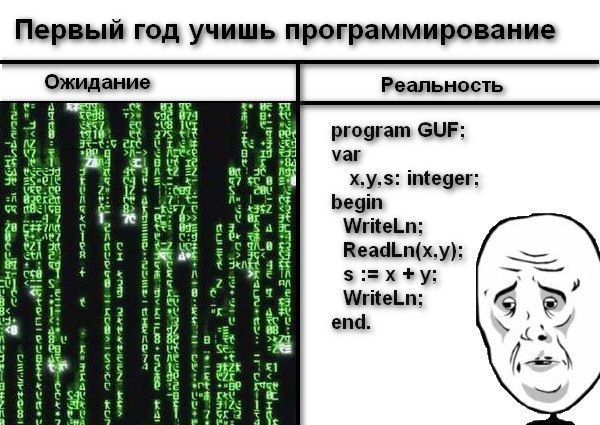How, having studied the basics of programming, move on to solving complex problems? Experts answer
Typically, a novice programmer reads books, listens to online lectures, or takes courses. Despite the fact that these materials usually contain tasks that need to be completed, many have the feeling that “you can’t just take and start writing your code.” This is partly a fair statement. In my opinion, the problem is solved in three stages.
Stage 1. Train on simple tasks.
There are many sites on the Web where a novice specialist can pump his skills, solving programming problems. Take the Codewars resource as an example. After registering on the site, you can begin to perform programming tasks known as “kata”. As in the martial arts, where this term came from, “kata” are intended for practicing certain sets of movements (keystrokes) that you may encounter in real work. Of course, it’s worth starting with solving the simplest tasks, and then gradually choosing more and more difficult ones. Performing these exercises and honing skills in working with various programming languages, the novice programmer will stop thinking about what sequence of actions will lead him to solve a particular problem when writing code. In addition, after completing each task, you can see how other participants have dealt with it, and learn something else from them.
Sites of this type are great for getting used to the syntax and core library of the language. Although, as a rule, they do not give skills to work with specific frameworks.
Stage 2. Write something of your own and put it in the public domain
What to do after you have already mastered writing simple programs? If you want to get more skills with the most popular frameworks of the selected programming language, you need to supplement the theory with practice! The most obvious way is to use one of the templates when writing a typical application.
First, read the necessary information about the development based on a particular framework, and then, based on this information and using the selected template, write your own application “from scratch”. Do not worry if the code is with small errors and inaccuracies, or it turns out not very beautiful. Remember: everyone, even the coolest programmers, made mistakes at the very beginning – this is definitely not a reason to give up your favorite business.
When you create the project, post it on GitHub (do not forget to add a description in README.md). With further employment, you can show this project to the employer – the presence of even a simple project in the portfolio will be better than its absence.
Stage 3. Finally get a job
Companies willingly take juniors to train them and make them full-fledged team members. Do not be afraid to get interviews: a distinctive feature of the IT sphere is that new people are always welcome here and ready to help them. A more experienced colleague can become your mentor, which means support on the way to becoming a first-class coder, as you want.
And most importantly, be purposeful! As the saying goes, the road arises under the steps of the walking.





